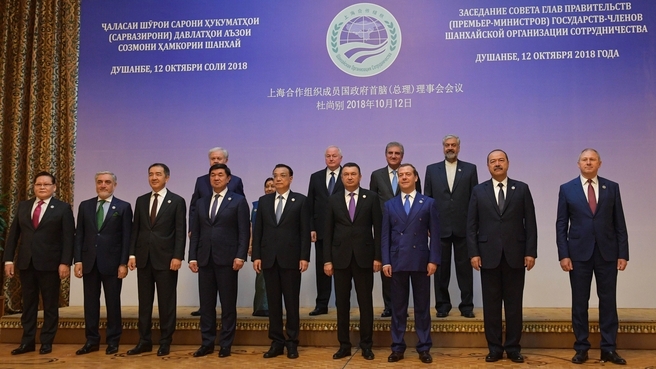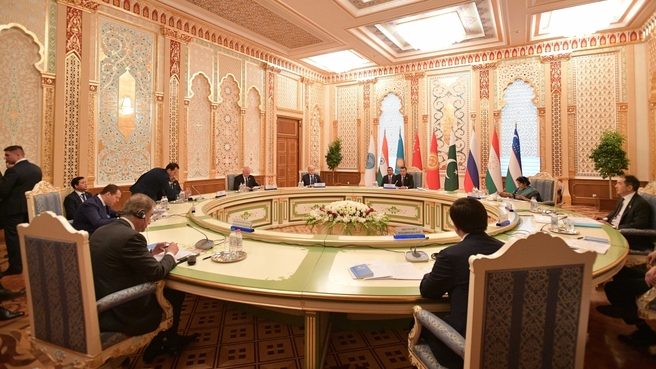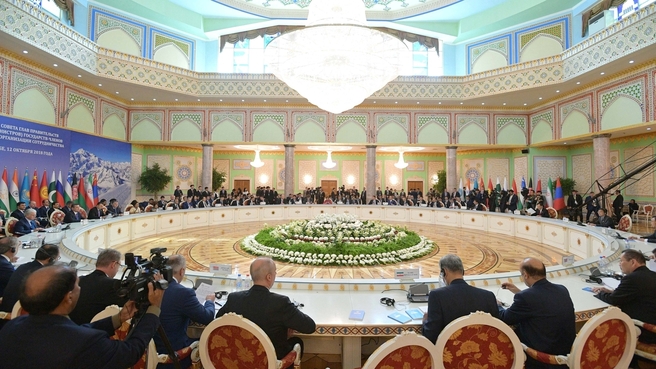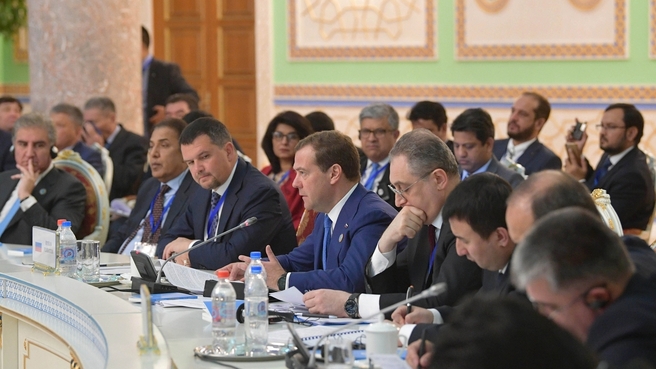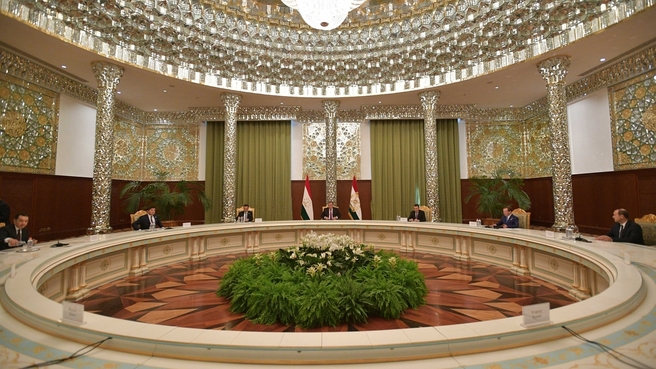Dmitry Medvedev: “This organisation is the best platform for aligning our national development strategies and trans-border projects. Our intention is to develop our cooperation across all areas. In 2017, Russia’s trade with the SCO member states increased to $120 billion. The positive trend has continued this year.”
Dmitry Medvedev’s remarks at the SCO Heads of Government Council Meeting
Documents signed following the meeting
The heads of delegations of the SCO Member States, the heads of delegations of SCO observer states, and guests representing international organisations
Heads of delegations of SCO member states:
Foreign Minister of India Sushma Swaraj;
Prime Minister of Kazakhstan Bakhytzhan Sagintayev;
Prime Minister of the People’s Republic of China Li Keqiang;
Prime Minister of Kyrgyzstan Mukhammedkalyi Abylgaziev;
Foreign Minister of Pakistan Shah Mahmood Qureshi;
Prime Minister of the Russian Federation Dmitry Medvedev;
Prime Minister of Tajikistan Kokhir Rasulzoda;
Prime Minister of Uzbekistan Abdulla Aripov.
Dmitry Medvedev’s remarks at the SCO Heads of Government Council Meeting
Retrospective
-
Meeting of the SCO Council of Heads of Government, 1 Desember 2017
-
Meeting of the SCO Council of Heads of Government, 3 November 2016
-
Meeting of the SCO Council of Heads of Government, 15 December 2015
-
Meeting of the SCO Council of Heads of Government, 15 December 2014
-
Meeting of the Council of SCO Heads of Government, 29 November 2013
-
Meeting of the Council of SCO Heads of Government, 5 December 2012
Mr Rasulzoda,
Ladies and gentlemen,
First of all, I would like to thank our colleagues from Tajikistan for their hospitality and the comfortable working conditions.
We have completed the work in a restricted format. We exchanged opinions on what is necessary to do to update the agenda of the Shanghai Cooperation Organisation. We talked about trade, investment, the digital agenda, high technology, transport, industrial production and energy. It is important to use all our resources to achieve the best results.
The external environment remains complicated and can hardly be called comfortable. The strategic stability system has undergone major tests. To retain their dominant positions, individual states are resorting to unfair competition. Protectionist measures and illegal unilateral sanctions are being introduced. Occasionally, things go as far as political blackmail. The bulk of the attacks are directed against Russia and China as key members of the Shanghai organisation, as well as our long-term partner Iran.
Economic risks are further aggravated by mounting threats to security. Terrorism, organised crime and drug trafficking are serious challenges that are of concern for all of our countries. As is known, Afghanistan with its ongoing hostilities and terrorist acts is faced with the most acute problems. We support efforts that lead to national reconciliation and economic recovery in that country.
Despite the known restrictions, the Russian economy is developing steadily and is largely in the black – that’s true of all key macroeconomic indicators - which makes us optimistic about our future.
Our organisation is the best available platform for merging our national development strategies and cross-border projects. Harmonising integration within the Eurasian Economic Union and the Belt and Road project is a case in point. An agreement on trade and economic cooperation between the Eurasian Union and China was signed in May. Several agreements between Russia and China have been concluded.
We are determined to strengthen our cooperation across the board. As a matter of fact, this is what is actually happening. In 2017, Russia's trade with the countries members of this organisation grew to $120 billion. The positive trend continues this year. Overall, this is a good result.
We need to make important decisions in order to fund projects. Separately, someone here noted the need to switch to mutual settlements in national currencies (we support this idea) and to reduce external risks. We need to act carefully and deliberately about this matter, though.
Our countries have common borders and vast territories. Unnecessary travel time involves unnecessary costs and lost business revenue. In order to expand our economic cooperation, we need full-fledged transport and logistics projects. We see eye to eye on this issue. Russia is willing to participate in these projects. We allocate significant amounts of funds for upgrading and expanding the main transport route infrastructure, including the West-East and North-South transport corridors. I’m confident that our common logistics arrangements will provide us with significant competitive advantages.
Of course, we welcome the decision made by Belarus, an observer country, to join the Agreement on Creating Favourable Conditions for Road Transport.
An inter-departmental programme on food safety will be signed following our meeting. It would be beneficial to involve observers and dialogue partners in it. Tens of millions of people that live in our countries should be provided with quality food products, and protected against epidemics as well as environmental disasters. In this respect we support what my colleague Lǐ Keqíang said on this subject.
The flow of people crossing the state borders is continuously growing. Of course we are interested in preserving this trend. I am sure that the implementation of the programme on developing tourism and the plan of joint actions for the 2019-2020 period will bring our states even closer.
Our agreements begin to work when they are more down-to-earth – contacts between entrepreneurs, cross-border areas and specific companies. Both the Business Council and the Interbank Association are called upon to facilitate this. We hope that the SCO countries will take an active part in the annual Forum on Small Business that will be held in Ufa in a week. This is the forum of the SCO and BRICS member countries.
As you know Russia proposed the establishment of a forum of governors of the SCO countries. We are grateful to our colleagues for supporting this initiative. We are looking forward to seeing representatives from the SCO states at the first meeting that will take place in this country – in Chelyabinsk in December. Our colleagues from Uzbekistan suggested elaborating a programme for developing inter-regional cooperation. These programmes supplement each other fairly well.
We see eye to eye when it comes to the development of humanitarian cooperation. Having its own spirit the SCO unites countries with rich histories and culture together with unique traditions. And we must do everything we can to get to know each other better.
The SCO University that unites almost eighty universities is one of the most successful humanitarian projects. It has been functioning for 10 years now. Such projects should be supported in every way. We proceed from the premise that interest in this cooperation will be growing and the number of participants will be on the rise.
In conclusion I would like to thank once again our colleagues from Tajikistan for the excellent organisation of our work. The presidency is being transferred to Uzbekistan so we wish our colleagues every success and are always willing to give them a helping hand.
Documents signed following the meeting of the SCO Heads of Government Council:
Decisions by the SCO Heads of Government Council (prime ministers) on the following matters:
- The Report of the SCO Secretariat on Implementing the Programme of Multilateral Trade and Economic Cooperation of the SCO Member States
- The SCO Financial Report on the Execution of the 2017 SCO Budget
- The SCO 2019 budget
- Voluntary assistance to support the activities of permanent SCO bodies
- Translation support for the permanent SCO bodies
- Amending the Guidelines for Remuneration, Guarantees and Compensation for SCO Permanent Body Officials
- Revising the Programme for Multilateral Trade and Economic Cooperation of the SCO Member States
- Drafting the Programme for Expanding Region-to-Region Cooperation between the SCO Member States
- The Plan of Practical Measures (road map) regarding cooperation between research institutions of the SCO member states in 2019-2020
- Implementing the Concept of SCO Member State Cooperation in Environmental Protection
Joint communiqué following the 17th meeting of the SCO Heads of Government Council (prime ministers)
The SCO Cooperation Programme for Food Security
The memorandum between the authorised departments of the SCO Member States on technical cooperation in the joint prevention and control of trans-border epizootic diseases.
